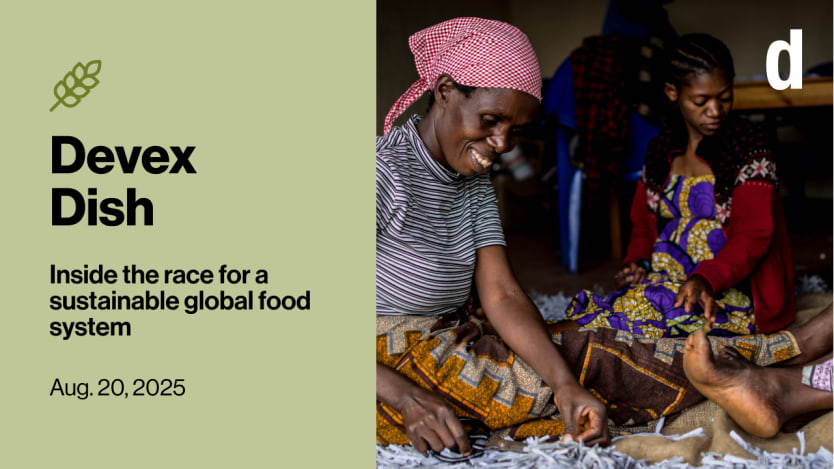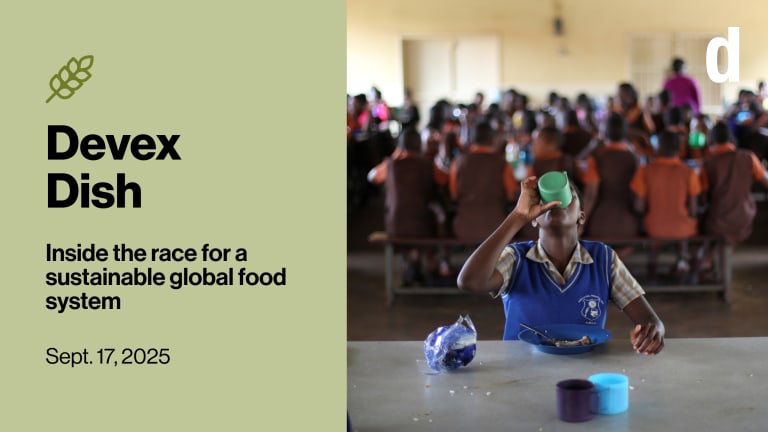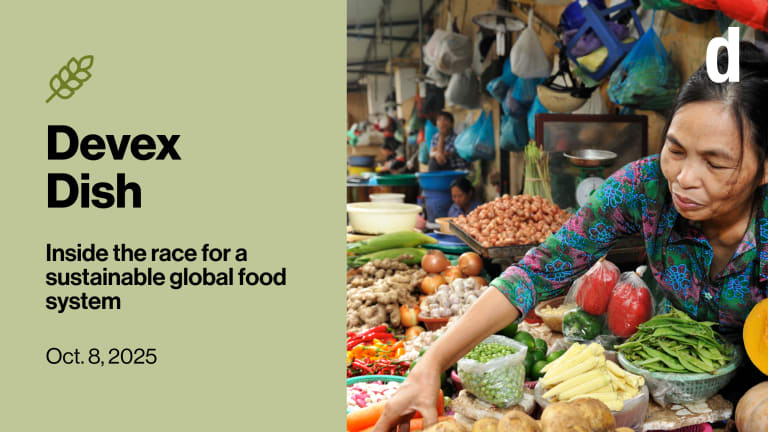Devex Dish: Cuts to WFP rations push refugees in Malawi to the edge
Presented by CropLife International

It was just before midnight when 22-year-old Louisa stood, uneasily, in a crowded bar inside Malawi’s Dzaleka refugee camp. She was there to work, having recently turned to sex work to survive.
“I have to do this if I have to take care of my daughter’s needs and make ends meet as our monthly cash transfers were recently drastically reduced,” she tells Devex contributor Madalitso Wills Kateta.
Louisa is not the only one. In a camp built three decades ago to house 12,000 but now home to nearly 60,000 refugees from the Democratic Republic of Congo, Burundi, Somalia, and Rwanda, desperation is rising. The abrupt loss of U.S. funding has pushed Dzaleka into a worsening humanitarian crisis. With U.S. humanitarian aid funding gutted under President Donald Trump’s administration, refugees are struggling to survive on dwindling food rations, facing rising malnutrition, and, in some cases, turning to desperate measures such as sex work and theft to support their families.
“Most of the refugees fled protracted conflict in the Great Lakes and Horn of Africa regions. With limited access to income-earning opportunities inside the camp, mainly due to the government’s encampment policy, WFP’s food assistance is their primary means of survival,” says Hyoung-Joon Lim, the World Food Programme’s country representative and director for Malawi.
Community leaders say children as young as 10 are entering the workforce, and families are marrying off girls early. “Families are resorting to early marriages as a means of securing financial stability, further compromising the education and well-being of young girls,” says Joyce Wamuyu, a Rwandan community leader. Police, meanwhile, report a 14% rise in crime, mostly break-ins and theft.
All this is happening against a backdrop of increasingly limited access to sexual health services, fueling fears of rising sexually transmitted infections, including HIV. The cuts are being felt across the board: UNHCR, the United Nations refugee agency, has downsized its Malawi office from 37 staff to just three, halted support for health personnel, and warned of more reductions to come. NGOs that once offered livelihood programs and training are also shuttering.
“This is more than an economic decision,” Innocent Magambi, CEO of refugee rights group Inua Advocacy, says of the cuts. “It is a direct threat to human dignity, safety, and the hope for any meaningful future for refugees in Malawi.”
Read: US aid cuts leave refugees in Malawi desperate and hungry
+ Next week is Devex Pro Week, where we dig into the key issues facing our professional members. We'll be looking at the impact of a turbulent 2025 on philanthropy, multilateral development banks, the United Nations, bilateral donors, and INGOs. To access a series of exclusive events, articles, and special reports for a full year at a $100 discount, sign up for Devex Pro now.
Power lunch
At a time when so many headlines in the sector feel grim, governments are driving what Carmen Burbano de Lara, director of the School Meals Coalition, calls “probably the most important development success story in recent years.”
School meals are already one of the most widespread social programs in the world, and they’re expanding quickly. In 2022, 418 million children received meals at school — 30 million more than before the pandemic. And crucially, governments are footing most of the bill. “Africa has expanded its programs by 20 million children just in the last two years. … Ninety-eight percent of it is government budgets,” Burbano says.
Some countries are scaling up fast. Ethiopia grew its program fivefold since joining the coalition in 2021, boosting national funding from $11 million to $127 million. Kenya, meanwhile, has linked its school meal strategy to local procurement, drought-resistant crops, and job creation — feeding children, while also providing market access for farmers and creating jobs, Burbano explains.
Financing innovations are fueling this momentum. Bolivia uses hydrocarbon taxes for meals, while other countries are exploring levies on sugary drinks, alcohol, and tobacco. Kenya is even negotiating a debt swap for school meals, where creditors forgive debt in exchange for government investment in feeding programs.
The private sector also has a role — from farming associations to catering companies — though challenges remain around food safety and ultraprocessed products. And on the tech side, about 20 governments now use WFP’s free School Meal Planner Plus app to design cost-effective, climate-smart menus.
All this sets the stage for Brazil, where the School Meals Coalition will gather next month for its biennial ministerial summit and release a global report on school meals.
Read: National leadership and innovative financing fuel a school meals boom
Eggsperiments
In April, UNICEF and the Ugandan government teamed up with Pristine Foods Limited to launch the Egg Powder Initiative for Children, or EPIC. The goal: Get powdered eggs into the diets of nearly 50,000 children by the end of this year — and 6.8 million children in Uganda between 2026 and 2030.
The idea came from engineer-turned-entrepreneur Joel Guma, who founded Pristine Foods in 2019. At first, he sold liquid and powdered eggs to bakeries and hotels. But reading about Uganda’s child stunting crisis made him rethink. “There’s a lot of food grown in Uganda, but why we became so interested in eggs is because eggs have more protein, pretty much more than any food you can find around here,” Guma tells Devex.
UNICEF picked up on the potential after Pristine’s powdered egg sachets passed government testing. The Norwegian Agency for Development Cooperation, or Norad, is now funding the project, part of a wider $8.7 million contribution to UNICEF’s nutrition fund.
Uganda has reduced stunting from 45% in 2001 to 26% today, but progress is slow. “Most families give a child a part of the family meal, and the children often then miss meat or the other kinds of sources of protein,” says Christiane Rudert, UNICEF regional nutrition adviser. “The protein gap isn’t really something that has been widely pursued or addressed by others.”
For now, trials in Karamoja — one of the country’s most food-insecure regions — suggest the sachets are working. And Guma is already thinking beyond borders: “I can’t fix everything, but this can go a long way in helping this problem.”
Read: Can a powdered egg a day keep malnutrition away? Uganda thinks so
The $77B solution
Africa’s agrifood systems are staring at a $77 billion annual financing gap — and a new report says it’s time to get creative.
The Malabo Montpellier Panel of agriculture and food security experts has released its latest study, MONEYWISE: Policy Innovations to Finance Africa’s Agrifood Systems, which lays out strategies to unlock new investment across the sector.
Bringing home the bacon
Your next job?
Technical Adviser (Fisheries)
Food and Agriculture Organization
Ghana
Donor funding is in decline, as is well-established — but the report also points out that while government spending on agriculture has increased in absolute terms across the continent, its share of total government expenditure has steadily fallen.
“Bold and innovative financial strategies will be indispensable to the sustainable transformation of Africa's agrifood systems,” says Ousmane Badiane, executive chairperson of AKADEMIYA2063 and co-chair of the panel.
The report points to examples in Malawi, Morocco, and Rwanda — from microfinance schemes targeting women and youth, to subsidies that crowd in private investment, to financial literacy campaigns and savings cooperatives. These case studies, the panel argues, show meaningful progress is possible when governments implement coherent investment plans, strengthen institutional capacity, and foster inclusive public-private partnerships.
Recommendations include expanding specialized financial institutions, leveraging digital solutions, introducing fiscal incentives, and scaling climate finance for resilient agrifood systems. With agrifood systems employing 65% of Africans, the panel warns that the stakes could not be higher.
Further reading: African countries adopt new 10-year agriculture strategy
Chew on this
Child malnutrition is a sign of conflict to come: Nigerian study links climate change, food, and violence. [The Conversation]
Hundreds hit with food poisoning in Indonesia after eating free meals from the president's flagship program. [The Guardian]
Draft of White House report suggests U.S. Health Secretary Robert F. Kennedy, Jr. won’t push strict pesticide regulations. [The New York Times]
Search for articles
Most Read
- 1
- 2
- 3
- 4
- 5








